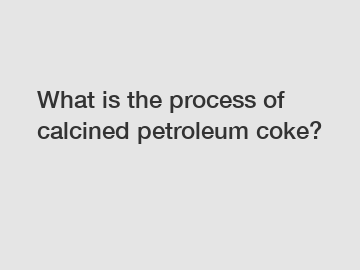What is the process of calcined petroleum coke?
Calcined petroleum coke (CPC) is a crucial raw material utilized in a wide range of industries, including aluminum production, graphite electrode manufacturing, and steelmaking. Derived from petroleum coke, this valuable carbon-based product undergoes a meticulous process known as calcination before it can be utilized effectively. In this blog post, we will delve into the intricacies of the calcination process, exploring its significance, stages, and the transformative journey of petroleum coke into high-quality calcined petroleum coke.
Understanding the Significance of Calcined Petroleum Coke:
To comprehend the importance of calcined petroleum coke, we must first recognize the characteristics and properties that make it an indispensable component in various industries.

1. High Carbon Content: Calcined petroleum coke possesses a high carbon content, usually ranging between 95-98%. This high carbon purity makes it an ideal choice for applications where a high carbon content is desired.
2. Heat and Electrical Conductivity: Alongside its high carbon content, CPC exhibits excellent heat and electrical conductivity properties. This makes it highly suitable for use in smelting operations, graphite electrodes, and other heat-intensive processes.
3. Anode Production: In the aluminum industry, calcined petroleum coke serves as a crucial material for the production of carbon anodes, which are essential components used in the electrolytic process of extracting aluminum from alumina.
Now that we have established the significance of calcined petroleum coke, let us dive into the detailed process of its production:
Stage 1: Selection of Raw Coke:
The first step in manufacturing calcined petroleum coke involves the selection of high-quality raw coke. Typically, low-sulfur, high-quality green petroleum coke is chosen as the base material for calcination. This carefully chosen raw coke ensures that the final product has desirable carbon, sulfur, and metal content, thus meeting industry specifications.
Stage 2: Crushing and Grinding:
Once the raw coke is selected, it is crushed and ground into fine particles. This process facilitates the removal of moisture and volatile matter present in the raw coke, as well as enhances the coke's physical properties, ensuring better performance during calcination.
Stage 3: Calcination:
The heart of the process lies in the calcination stage, where the transformed properties of raw coke emerge. The crushed and ground coke is then fed into specialized rotary kilns, generally operating at temperatures around 1200-1350°C (2192-2462°F). In these kilns, the coke undergoes a complex series of chemical and physical reactions.
During calcination, the volatiles and residual impurities present in the raw coke are driven off, leaving behind a high-purity carbon matrix. The process also leads to the development of specific characteristics, such as increased crystallinity, improved mechanical strength, and enhanced electrical conductivity. The duration of calcination and the temperature conditions depend on the desired properties and end-use requirements of the calcined petroleum coke.
Stage 4: Milling and Sizing:
Following calcination, the resulting calcined petroleum coke is meticulously milled and graded to obtain the desired particle size distribution. This ensures that the obtained product is consistent in size, making it suitable for various applications such as anode production or carbon-based refractories.
Conclusion:
The production of calcined petroleum coke is a meticulous and transformative process that involves careful selection of raw coke, crushing, grinding, and the crucial calcination stage. This process results in the production of high-quality carbon-rich material that finds its application in diverse industries.
As consumers, it is essential to understand and appreciate the complexity involved in the creation of materials crucial to the manufacturing processes around us. Calcined petroleum coke exemplifies how seemingly ordinary raw materials undergo a remarkable metamorphosis to cater to various industries, thereby shaping our modern world.
Are you interested in learning more about petroleum coke carburizing agent manufacturers, graphite electrode uses, Coal Carburizer Graphite Petroleum? Contact us today to secure an expert consultation!
214
0
0

Comments
All Comments (0)